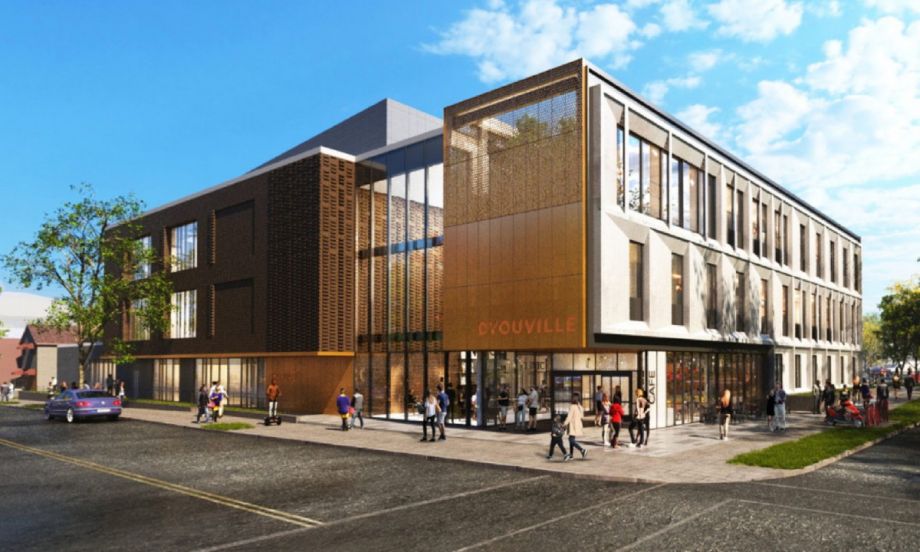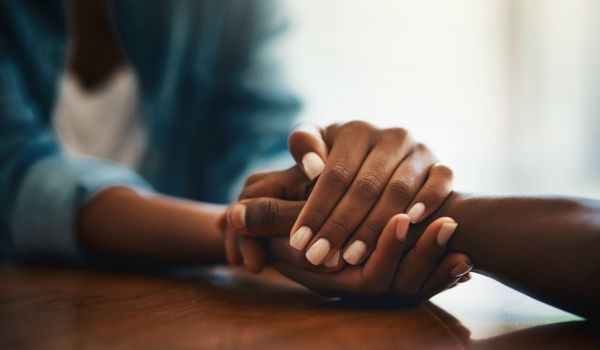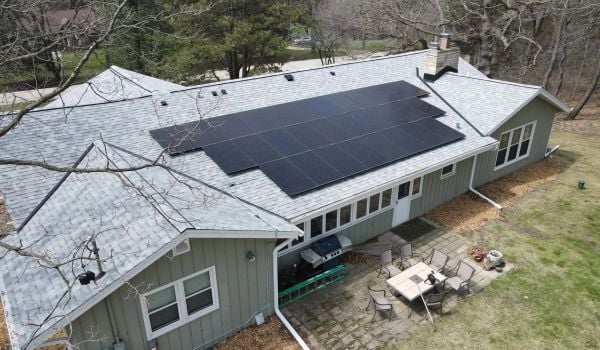Three and a half years ago, Lorrie Clemo, the president of D’Youville College in Buffalo, New York, was staring down a projected shortage of 10,000 healthcare workers in the region by 2024. At the same time, the West Side, where D’Youville is located, faced its own healthcare shortage. The predominantly low-income immigrant and refugee community had long fought against the lack of affordable, accessible care.
Looking at the needs of the West Side and overall region, Clemo believed the private college could get creative to address both. The result is the Health Professions Hub, what the college calls a “first-of-its-kind center” that will train a new workforce for healthcare jobs. There’s also an on-site clinic, pharmacy, and cafe, all open to the public. The goal isn’t just to train new healthcare professionals but to improve community access to care and address the cycle of chronic illness on the West Side.
“The question was how could we use the strength of our college, and our strong desire to see our students succeed, and help meet the needs of the surrounding community?” Clemo asks.
As part of larger strategic planning for the college that started in 2017, D’Youville identified three goals when it came to investing in healthcare: reduce the area’s worker shortage by graduating 1,500 students trained in healthcare jobs each year — with a focus on nursing — while addressing the neighborhood’s health inequities and creating new jobs for residents of the West Side.
That launched both an internal engagement process among D’Youville students, faculty and staff and external engagement with local residents. There were practical concerns, like how to design training and educational spaces that fit instructor and student needs, alongside wide-ranging questions, like how to welcome the community in
A specific team focused on community engagement identified core needs of the West Side: easily-accessible primary care, more holistic services like physical therapies, a pharmacy, nutrition resources and education. With minimal public transit, there was a desire for “one-stop-shop” healthcare, as Clemo puts it.
There’s a high school on the D’Youville campus, and one request from that partnership was space where younger students gain exposure and workforce pathways to different healthcare professions.
It would be a challenge to design a building that met many different needs, so D’Youville brought on the firm CannonDesign to help lead stakeholder meetings. “It was a very interesting program, but it didn’t fit neatly into any silo of a type of building,” explains Michael Tunkey, a lead architect with CannonDesign.
Though D’Youville has an inward-facing campus, the team decided to “turn the building around and put it right on the corner,” Tunkey says. “It’s a huge change as to how D’Youville has been in the community before, and signals that welcoming aspect.” Glass elements, public artwork and a street-facing pharmacy will make up the exterior.
CannonDesign worked with the Albright-Knox Art Gallery to develop a site-specific art concept with a community participation and education component. The team is now in talks with local designers Julia Jamrozik and Coryn Kempster about adding steel steppers in bright colors along the building exterior and collaborating with Stitch Buffalo, an economic nonprofit for refugee women, to design patterned pillows that will decorate stadium seating within the building’s three-story atrium.
Visible from the street will be an area known as “the hive” — designed with a honeycomb-like facade — with a cafe and educational kitchen. “Everything that’s highly activated and involved people mixing from different disciplines, we pushed those off into this hive,” Tunkey explains.
The first floor will also hold a clinic run by the Catholic Health System, while the second floor is dedicated to training and education with a simulation training center. Using immersive technology inside a black box studio with moveable walls, teachers and students will be able to mimic spaces like emergency departments and operating rooms. The third floor holds a large event space that will serve as a “health design and innovation center,” according to Clemo.
The spaces must be flexible to accommodate different programming planned for the hub. Certificates and trainings will be offered to high school students, their parents and others in the community through workforce development programs. Programs offered this fall will train people in roles like community health worker, patient navigator and pharmacy technician. The hub will also train in cultural competency for health workers, an important consideration given the population diversity of the West Side.
The hub is expected to open by the end of this year and D’Youville will track what’s working and can potentially be replicated elsewhere. “It was part of our value proposition to [New York Governor Andrew Cuomo] when we approached him about supporting this project,” says Clemo. “We’ve started to archive a playbook of everything we’ve done to be able to replicate this and share it out.”
As demands for healthcare services have increased due to COVID-19, the college faced pressure to accelerate its opening date and pushed it up to this November. “It would have been great if we opened six months earlier,” Clemo says. “The foreshadowing of what our urban areas need for healthcare, we were spot on. Right now we’re prepared for what this community is in need of, especially in this pandemic.”
Editor’s note: We’ve corrected the spelling of Michael Tunkey’s name.

Emily Nonko is a social justice and solutions-oriented reporter based in Brooklyn, New York. She covers a range of topics for Next City, including arts and culture, housing, movement building and transit.
Follow Emily .(JavaScript must be enabled to view this email address)
















